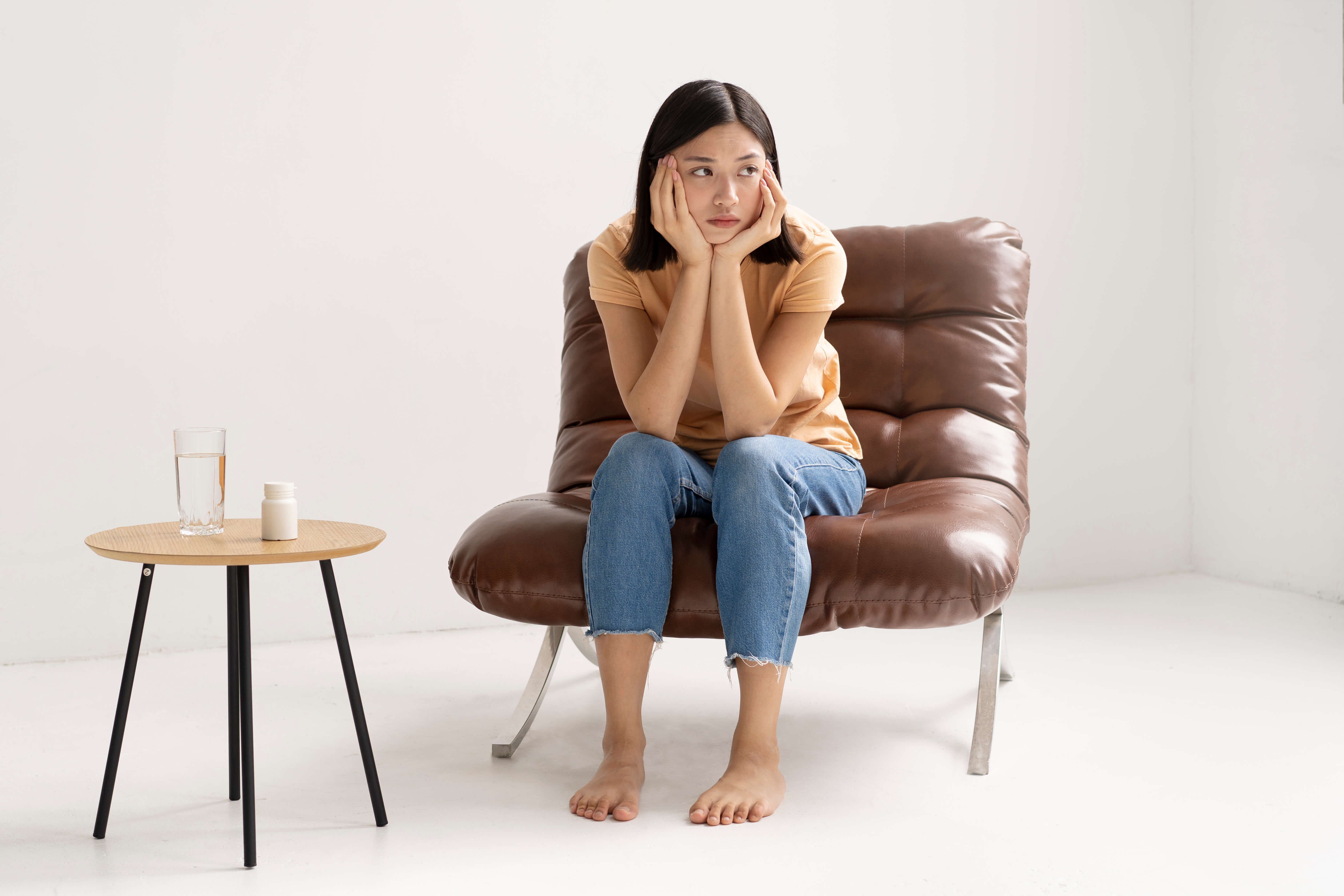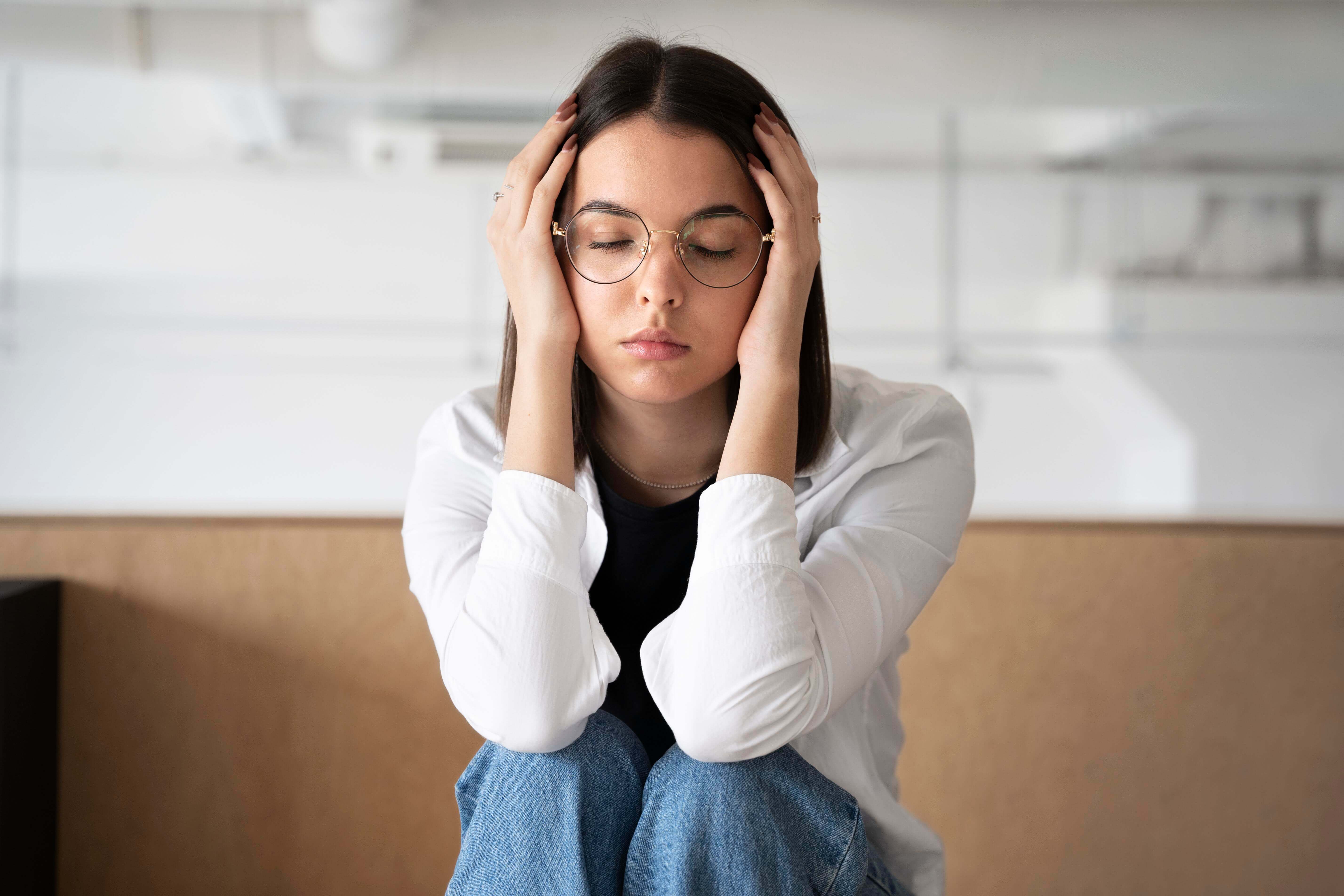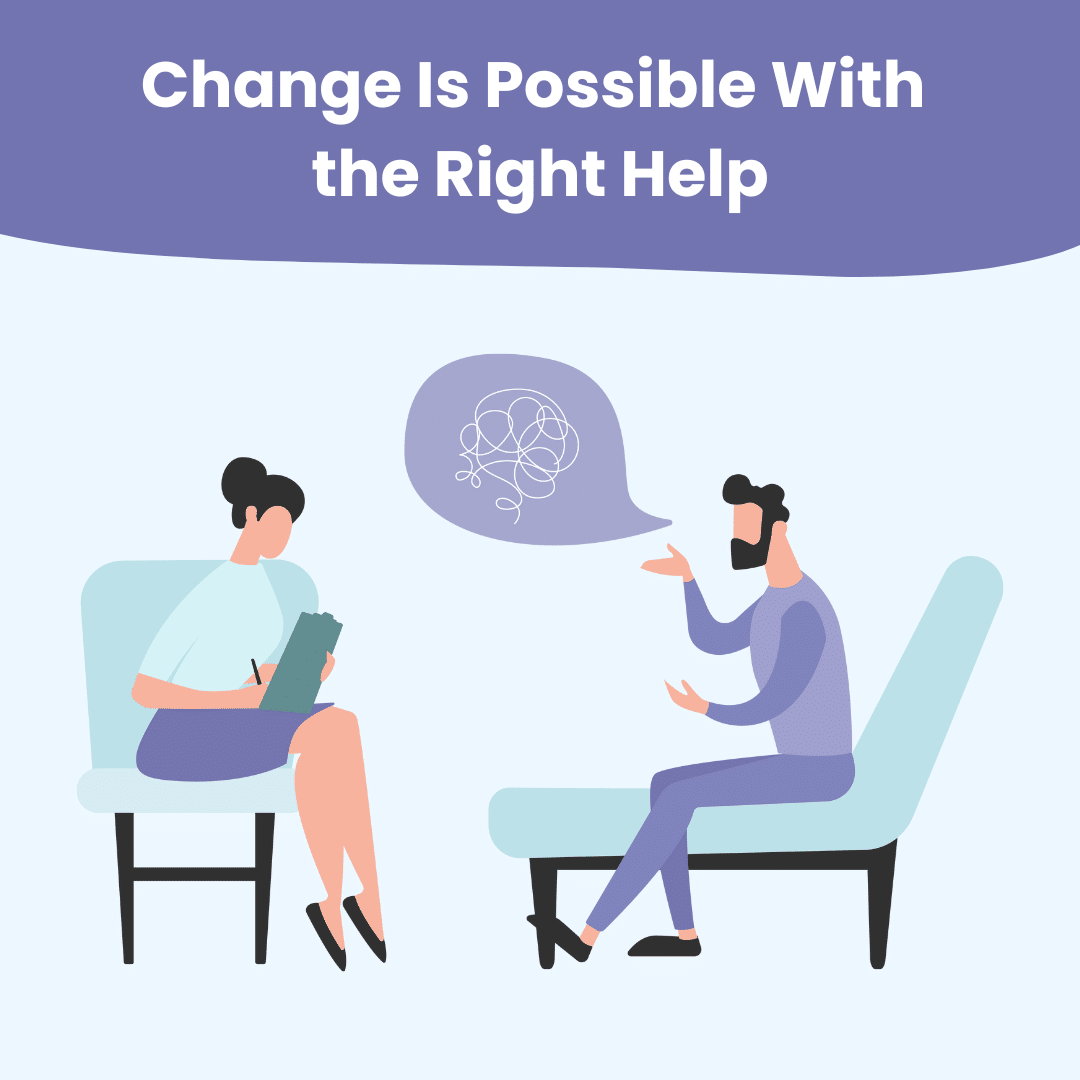
The 5 most common anxiety symptoms to look out for include excessive worrying, fatigue, dissociation, panic attacks, and irrational fears.
These 5 symptoms can disrupt our daily functioning, influence our social relationships, and affect our academic or work performance.
Many people may have anxiety at some point in their lives. In fact, the feeling of anxiety is so common that many of us may also experience it regularly.
However, when anxiety symptoms become larger than the situations that caused them and significantly affect our lives, they could be symptoms of an anxiety disorder.
In this article, we discuss the 5 most common symptoms of anxiety to look out for and when to seek professional counselling.
What Is Anxiety?
Anxiety is an emotion that may include feelings of worry, tension, stress, and physical changes like a pounding heart or high blood pressure.
Anxiety and fear are usually used interchangeably, although there are differences between them.
Anxiety is a future-oriented and chronic response that we may give to perceived threats, whereas fear is a present-oriented and appropriate response to specific and real threats.
Occasional anxiety is a part of life. For example, people may have anxiety about their work, finances, or family issues – but this anxiety is temporary.
Anxiety disorders do not go away easily and may even worsen over time, especially without the right counselling services.
When this anxiety worsens, it may lead to other conditions such as generalised anxiety disorder, social anxiety, panic disorder, or phobia-related disorders.

What Is an Anxiety Disorder?
An anxiety disorder is a type of psychological condition which may include anxiety symptoms such as dread, fear, and a pounding heart.
Physical symptoms of anxiety could include sweating, shaking, muscle pain, gastrointestinal issues, headaches, and so on.
Sometimes, the feeling of anxiety can be helpful as it helps us notice dangerous situations. But when anxiety becomes so intense that we start dreading the future and imagine danger, it could cause us more harm.
An anxiety disorder usually occurs when:
- It interferes with daily functioning
- We react intensely to normal situations
- We cannot control our emotional responses to any situations
It can be hard to live with anxiety symptoms. Fortunately, counselling in Singapore can provide effective therapeutic plans to treat and manage anxiety disorders.
Do I Have Anxiety or Am I Just Anxious?
Being anxious isn’t always unhealthy. Anxiety is a spectrum of sorts, where we can either have normal daily anxiety that helps us protect ourselves or intense anxiety that may interfere with our lives.
In general, psychologists may diagnose someone with an anxiety disorder if the anxiety:
- Is out of proportion to the actual situation
- Is not age-appropriate
- Impairs the ability to function healthily
Another way you can identify if you have anxiety or are just feeling anxious is to notice your responses to situations and uncertainty.
For example, if you have an anxiety disorder, you may have out-of-the-ordinary emotional responses and excessive anticipatory stress to uncertainty.
On the one hand, with normal feelings of anxiety, a person may quickly move on from the situation.
On the other hand, an ‘abnormal’ anxiety, or anxiety disorder, is defined by uncontrollable worries that may not go away easily, even when there’s nothing to fear or worry about.
5 Anxiety Symptoms
The anxiety symptoms depend on the type of anxiety disorder. However, we have listed 5 anxiety symptoms that you can use as a guide to analyse if you struggle with anxiety.
1. Excessive Worrying
The most common anxiety symptom is worrying excessively and without any control.
The worry may be completely disproportionate to the current situation. For example, a student who has already finished their exam and scored well may still worry about their performance in the next year’s exam.
The student might say, “What if I fail next year’s exam? What if I don’t know any answers.” This thought is disproportionate as the student may be studying well and may even be a high scorer.
Excessive worrying is usually common in generalised anxiety disorder. A psychologist may diagnose someone with GAD if the anxiety symptoms last for at least 6 months and are uncontrollable.
The worrying may also be intrusive. Intrusive thoughts or worries may include disturbing or negative images, thoughts, and feelings.
These intrusive thoughts may affect a person’s ability to:
- Concentrate
- Pay attention
- Make decisions
- Trust their instincts and thoughts
Based on recent research, nearly 1.6% of Singaporeans struggle with generalised anxiety disorder.
2. Fatigue
Fatigue refers to extreme tiredness. People with anxiety disorders may experience severe fatigue that makes it hard to get out of bed, cook for themselves, or even take care of their daily hygiene.
Common signs of fatigue include:
- Tired eyes
- Headaches
- Muscle aches
- Tired legs
- Stiff shoulders
- Exhaustion
- Boredom
- Restlessness
- Discomfort or unease in the body
Some people with anxiety symptoms may feel fatigued after an anxiety attack, while others may feel fatigued throughout the day.
The causes of fatigue can be multiple. For example, a person may have fatigue due to anxiety symptoms, muscle tension, insomnia, or even hormonal effects of chronic anxiety and stress.
Sometimes, fatigue can also point to other mental health conditions, such as:
- Depression
- Chronic stress
- Post-trauma stress
- ADHD
Hence, fatigue cannot be used as the single determinant to diagnose someone with an anxiety disorder.
However, if you have severe fatigue and one or two of the other anxiety symptoms, you may want to consider seeking professional support to explore further.
3. Dissociation
Dissociation or derealisation is losing touch with reality and one’s current surroundings. Imagine looking at yourself from a third-person perspective; that could be similar to how dissociation feels.
Dissociation is an anxiety symptom where a person may be in a dissociative state and cannot identify themselves, their thoughts, memories, and sometimes, even their identity.
A person can be in a dissociative state during an anxiety attack or may relapse to the state once in a while, especially if they struggle with chronic anxiety.
When you are in a dissociative state, you may not remember the things that occurred during dissociation. This can last for a few minutes and up to multiple days and weeks, depending on the severity of your anxiety.
Mild symptoms of dissociation could include daydreaming, becoming immersed in a particular media, or struggling with highway hypnosis (ie zoning out during driving).
Severe symptoms of dissociation could include identity confusion, feeling like you are not real, memory issues, intense mood swings, memory lapses, and feeling as though the world is fake.
If you are living with anxiety, you may use dissociation as a coping mechanism during extreme stress or panic.

4. Panic Attacks
Panic attacks are an intense fear response to stressful situations. A person may have a panic attack suddenly, once in a while, or regularly.
Experiencing regular panic attacks may lead to panic disorder. However, a panic attack is also an anxiety symptom.
Physical symptoms of panic attacks could include nausea, shortness of breath, racing heartbeat, and intense sweating.
The DSM-5 indicates that panic attacks can be unexpected or expected.
Unexpected panic attacks may appear without a clear trigger or cause. Expected panic attacks may occur due to external stressors such as work stress or maladaptive behaviours.
Usually, people with anxiety disorders may experience expected panic attacks, as the cause is often clear (eg overthinking about the future, uncertainty, dread about an exam).
5. Irrational Fears
Fear is natural and, most of the time, even important. It is our brain’s way of telling us when we’re in danger physically or emotionally.
However, this fear may become irrational when it is out of proportion to the situation. Irrational fears are a common anxiety symptom.
For example, irrational fear may appear before an interview, during flight turbulence, or even after presenting a project.
The person may become terrified of the possibility of dying during the turbulence, failing an interview even after optimal preparation, and imagining getting fired due to a bad presentation.
The fear may become problematic and indicate severe anxiety when the person starts avoiding events and people due to their fear.
For example, they may never take vacations that may require a flight or may avoid attending interviews even if it means that they may stay unemployed for a long time.
Irrational fears may occur even when there is no threat or danger. The fear can also be related to future events.
The fear comes with intense and disturbing thoughts and a chaotic emotional reaction (eg panic attacks).
Another common example is fear in social situations, also known as social anxiety.
For example, going on dates or socialising with strangers has no real danger. But a person with irrational fear may worry about a fictional situation in extremes, like their date humiliating or shaming them. This thought may cause the person to stop dating altogether.
Some other common types of phobias include:
- Fear of animals
- Fear of drowning
- Fear of natural calamities like hurricanes
- Fear of needles and injections
When to Seek Professional Help for Anxiety Symptoms

A few important factors can help you identify if you have an anxiety disorder or if you are feeling anxious about a specific and temporary problem.
These factors include:
- Intensity of symptoms
- Frequency of symptoms
- Duration
- Interference
- Triggers
- Influence on your overall life
Questions to help you reflect on whether you need professional therapy
- Does your anxiety feel so intense that you are unable to perform a specific activity? Do you find it hard to manage these symptoms when they occur?
- Do you notice that your symptoms occur regularly, perhaps once or twice a day?
- Do your anxiety symptoms disappear after you handle the situation? Or do you experience anxiety for a long time? For example, if you have an interview, does your anxiety remain all day and even after you finish giving the interview? Or are you anxious about everything all the time? (ie GAD)
- Does your anxiety affect your ability to perform other regular activities like maintaining friendships or engaging in self-care?
- Do you have any specific triggers that make you feel anxious? Or do you have so many triggers that you stop doing common things like shopping or travelling?
- Try to think about how your anxiety symptoms affect your overall life. Are you struggling to work, form relationships, or feel part of a community? How would you want to live your life if it weren’t for your anxiety?
Also, consider how your anxiety symptoms affect your life. For example, if you fear snakes, you may find it easy to avoid them.
However, if you have social anxiety, it may be harder for you to avoid all social situations, and this fear will likely affect your life much more.
If your anxiety symptoms consistently affect your life or make it hard to function every day, you can consider seeking a Singaporean counsellor.
Related Articles
Latest Articles
Recent Posts
- Understanding Employee Assistance Programs in Singapore (And Why Your Company Needs One)
- A Therapist’s Guide to Setting Boundaries with Parents
- Anger Management in Singapore: Top 6 Benefits
- Individual vs Group Counselling in Singapore: What’s Right for You?
- Thinking of Switching Your Therapist in Singapore? Read This First


